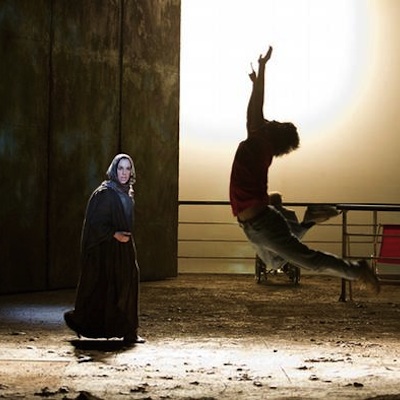The Death of Klinghoffer : The Opera So “Controversial,” You Can’t See It in Philly

A scene from The Death of Klinghoffer.
When I arrived at the Metropolitan Opera in New York to see The Death of Klinghoffer, the John Adams’s work that has caused an international uproar, I was expecting tensions to be high at the theater. However, I was not prepared to have my Kiehl’s shopping bag confiscated and checked (along with every single bag opera goers brought into the venue).
The security measures were extremely tight, almost ridiculously so: I purchased a bottle of water at the concession stand and was not permitted to bring it in the auditorium. This isn’t a house rule, mind you; it was a rule for this particular production.
To be frank, I was intimidated, overwhelmed, and a little on-edge before the opera even started. But then, the house lights dimmed; the orchestra and chorus began the Prologue, titled “Chorus of Exiled Palestinians,” and I left the insane world the Met administration created to get into the opera house to see a piece of art; I took in what I would argue is one of the most profound modern opera works that has been produced by the company.
However, due to a rash of misinformed and misunderstood critics and protestors, the Met’s production has come under extreme fire, causing the company to not only cancel their usual radio broadcasts of the performances, but to also ditch their plans on air the opera as part of their “Live in HD” series at movie theaters across the country. Philadelphia was slated for several screenings of the work, but that’s not happening.
And if you ask me, that’s a damn shame.
The Death of Klinghoffer is not new; it was first produced in 1991 at the Theatre Royal de la Monnaie in Brussels, and has had subsequent performances around the world, including a concert version in Philadelphia back in 2005. The work is loosely based on the real life terroristic hijacking of the Italian cruise liner Achille Lauro in 1985, which lead to the death of one of its wheelchair-bound passengers, Leon Klinghoffer: Klinghoffer, who was Jewish, was shot in the head and his body and wheelchair were thrown overboard by the Palestinian hijackers.
The opera attempts to widen the lens of the hijacking to present the social and psychological rationale behind the Israeli and Palestinian

A scene from The Death of Klinghoffer.
conflict; through a series of hauntingly gorgeous choral moments, Adams presents commentary that illuminates the stark differences between both sides, and suggests that no real end to the conflict between the groups is in sight. One such scene is when the young hijacker Omar, played by dancer Jesse Kovarsky, envisions what can only be deducted as a motherly figure, sung with great passion by Maya Lahyani, urging him on to kill, not only others, but himself. It’s a terribly poignant moment leading to Omar’s ultimate action: shooting Klinghoffer at point-blank range.
David Robertson masterfully conducts the score, and the Met chorus and orchestra gave a powerful performance. The ensemble cast, including Paulo Szot as the ship’s captain and Michaela Martens as Marilyn, Klinghoffer’s wife, give particularly pointed performances throughout the evening.
There have been cries that the work is anti-Semitic, so much so that the Met gave a page of commentary in the playbill to Lisa and Ilsa Klinghoffer, two daughters of Leon Klinghoffer. In their comments, they state, “We are strong supporters of the arts and believe that theater and music can play a critical role in examining and understanding significant world events. The Death of Klinghoffer does no such thing. It presents false moral equivalences without context and offers to real insight into the historical reality and the senseless murder of an American Jew.”
With all due respect, I disagree with the Klinghoffers’ observations. The work is complex and does not, as some have suggested, romanticize the hijackers. As Supreme Court Justice Ginsburg put it in a recent interview about the opera, “There was nothing anti-Semitic about the opera…The terrorists are not portrayed as people that you would like. Far from it…They are being portrayed as bullies and irrational.”
When John Adams was questioned by Met producers about the debate surrounding the work, he said, “I didn’t do it to be controversial or to be provocative…Because opera is the most emotionally charged of all art forms, it is more, than fiction or film, the most appropriate expressive vehicle to address terrorism. Terrorism itself is a symbolic act…What we try to do in this opera is to penetrate that symbolism and to examine the narratives that led up to that.”
As I left the theatre that evening, about two-dozen police officers lined the exit of the opera house into what is normally the peaceful, awe-inspiring Lincoln Center plaza. After I recovered by little Kiehl’s shopping bag, I walked towards the subway, with two conflicting feelings: one was a sense of catharsis after watching the work, the other was an uneasiness that the world we live in makes operas like Klinghoffer “unspeakable” and unreachable for the masses.
“The Death of Klinghoffer” runs at the Met Opera through November 15. For tickets and more information, click here.


